Bitcoin has captivated the world since its creation in 2009. The underlying blockchain technology provides opportunities for innovation across industries. As we enter 2024, bitcoin and blockchain development skills are in high demand.
This guide is an entry point for aspiring developers who want to build expertise in this fascinating domain. We will cover the core concepts of Bitcoin and blockchain technology, the programming languages and frameworks used for development, the skills needed, where to get Bitcoin development jobs, and practical projects to apply your knowledge.
Whether you're a student, professional, or hobbyist developer, this comprehensive guide will equip you with the skills to thrive as a Bitcoin and blockchain developer.
What is Bitcoin Development?
Bitcoin development refers to working on the software and systems that power Bitcoin and the broader blockchain ecosystem. It involves several domains - core protocol development, application and product development, research, and infrastructure development.
Some examples of Bitcoin development work:
- Contributing code to the Bitcoin Core software that runs the Bitcoin network and infrastructure. This may involve fixes to the consensus code that powers the blockchain or improvements to node performance and security.
- Building applications like digital wallets, exchanges, payment services, decentralized finance platforms, and other products that utilize the Bitcoin network and protocol. For example, creating a mobile Bitcoin wallet app for Android and iOS devices.
- Research focused on improving Bitcoin's privacy and scalability features like the Lightning Network. Academic papers and technical standards come under this domain.
- Developing tools, APIs, testing suites and devops pipelines used by other Bitcoin developers and services. For instance, creating automation scripts to spin up test Bitcoin nodes quickly.
Generally, Bitcoin development spans cryptocurrency engineering at both the protocol layer and in innovative applications interacting with the public Bitcoin blockchain.
Where should I start to learn Bitcoin Development?
The first step is to gain a strong understanding of blockchain technology and Bitcoin protocol fundamentals. Read the Bitcoin whitepaper, online documentation, and books to grasp concepts like cryptography, consensus mechanisms, wallets, and transactions.
Next, start learning languages like C++, Python, JavaScript, and Solidity, which are used to build Bitcoin and blockchain applications. Work through tutorials, review example projects on GitHub, and take specialized courses to practice core programming and development skills.
Install Bitcoin Core and experiment by running your node, making test transactions, and exploring the blockchain ledger. Tinkering will build practical experience.
Participate in developer communities like the BitcoinDev subreddit to learn from senior contributors. Collaborating on open-source Bitcoin projects is a great way to practice and showcase your skills to future employers.
Consider specialized certifications like Chaincode's Certified Bitcoin Professional, which validates your expertise.
As you gain more experience with projects and problem-solving, consider pursuing a full-time developer role or freelance opportunities at crypto startups and blockchain companies to become a professional Bitcoin developer.
Understanding Frameworks and programming languages used for Bitcoin Development
Here are some languages you need to learn to become a bitcoin developer.
1. C++
The predominant language used for maintaining and extending the Bitcoin Core protocol is C++. It offers high performance and security balance and provides low-level memory access required for core blockchain functions. C++ powers key mechanisms like validating UTXOs, connecting network peers, and managing wallets. Knowledge of data structures, multithreading, nodes, mining, and cryptography is required.
2. Python
With its simplicity and vast libraries focused on blockchain analysis, statistics, and rapid prototyping, Python has emerged as a popular choice. It allows quick testing of concepts before committing development in lower-level languages. Python aids data-driven tasks - extracting insights from blockchain data with Pandas and visualizing analytics using Matplotlib graphs, statistical modeling, and machine learning algorithms.
3. JavaScript
For frontends allowing users to interact with the blockchain, JavaScript is ubiquitous. Integrating web apps with back-end networks, making calls to nodes from browsers using RPC, and real-time data streaming can be achieved efficiently. With Node.js event-driven architecture, developers can handle many concurrent requests efficiently in production environments.
4. TypeScript
As applications grow more complex, TypeScript offers static typing for scale over plain JavaScript. Type safety leads to fewer bugs and better documentation of large codebases. It compiles to plain JavaScript, lowering adoption barriers. Popular with Angular frontend framework.
5. Solidity
Ethereum's native smart contract coding language, Solidity, is essential for programmers looking to work on decentralized applications beyond Bitcoin. Skills in Solidity are in demand due to the rapid growth of DeFi and crypto projects needing token implementation.
6. Go Language
An efficient language well-suited for building high performance applications with networking, concurrency in mind. Libraries like Geth provide Ethereum client functionality. Lightning Network implementations use Go for Bitcoin scalability.
7. Rust Language
An emerging modern language focused on speed, efficiency, and security. The learning curve is steeper than that of other languages, but it prevents many vulnerabilities and problems. Rust has the potential to develop robust and secure blockchain clients & peer implementations.
By learning these languages, Bitcoin developers can have the flexibility to program different layers and remain up-to-date as projects advance over time across the ecosystem, spanning infrastructure to applications.
More Frameworks to learn to become a Bitcoin Developer
Here are some additional key Bitcoin and blockchain frameworks useful for becoming a Bitcoin developer:
1. BitcoinJ
An open-source Java library for working with Bitcoin. It allows developers to interface with the Bitcoin peer-to-peer network and blockchain easily. Useful for building wallet applications, micropayment services, and other tools that transact using bitcoin.
2. BTCPay Server
An open-source, self-hosted payment processor for Bitcoin and other cryptocurrencies. It is useful for merchants and developers to accept payments in a decentralized manner without third-party payment processors. It also helps improve privacy, save fees, and integrate into e-commerce sites.
3. LND
Leading Lightning Network daemon written in Go for running nodes that allow greater Bitcoin scalability and fast microtransactions leveraging off-chain state channels. Essential for future layer-2 Bitcoin development work.
4. Libbitcoin
A C++ Bitcoin library targeted at node operations and full blockchain validation. It includes valuable APIs and programs for operating Bitcoin peers in a production server environment meeting enterprise needs.
5. Blockstream Green
An open-source Bitcoin wallet architecture and SDK focused on implementing security and privacy best practices. It is also an excellent resource for studying air-gapped transaction signing, managing keys, integrating hardware wallets, and other vital concepts.
7 Top Resources to Learn Bitcoin and Blockchain Development in 2024
1. CryptoZombies
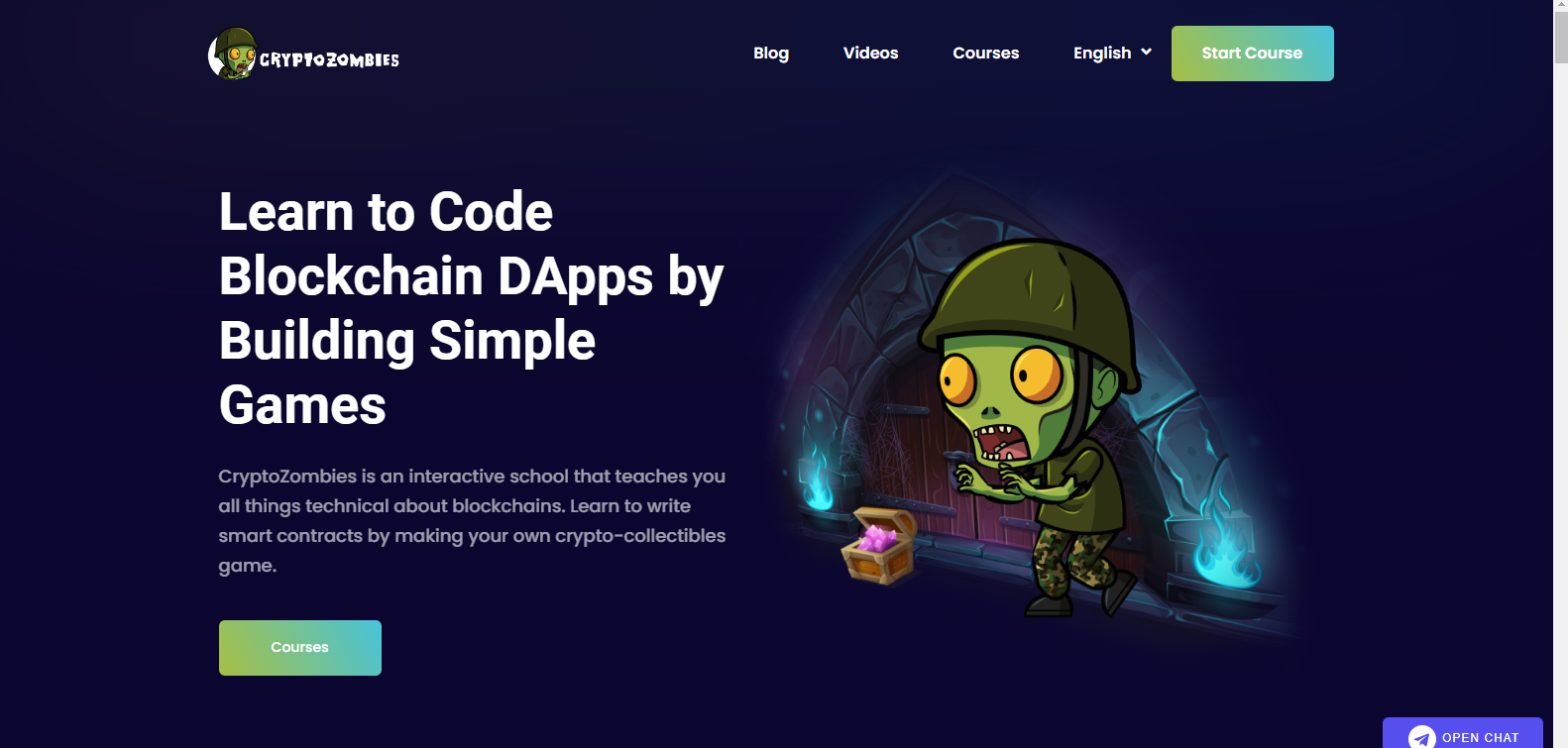
CryptoZombies is an interactive code school that teaches you to write smart contracts on Ethereum by building your own games. Created by Loom Network, it takes beginners through building zombie battles, ransom crypto-collectibles marketplace and other decentralized applications using Solidity in a learning by building format across over 8 chapters.
Lessons start with simple functions like random number generation, private/public access control for contract functions and move up to intermediate concepts like issuing ERC token contracts, creating custom coins and opening mystery crates with rare items. The additional Loom JavaScript lessons teach client side integration with Ethereum using Web3 and Metamask for calling contract functions with easy explanations and visuals.
2. Udacity Blockchain Developer Nanodegree
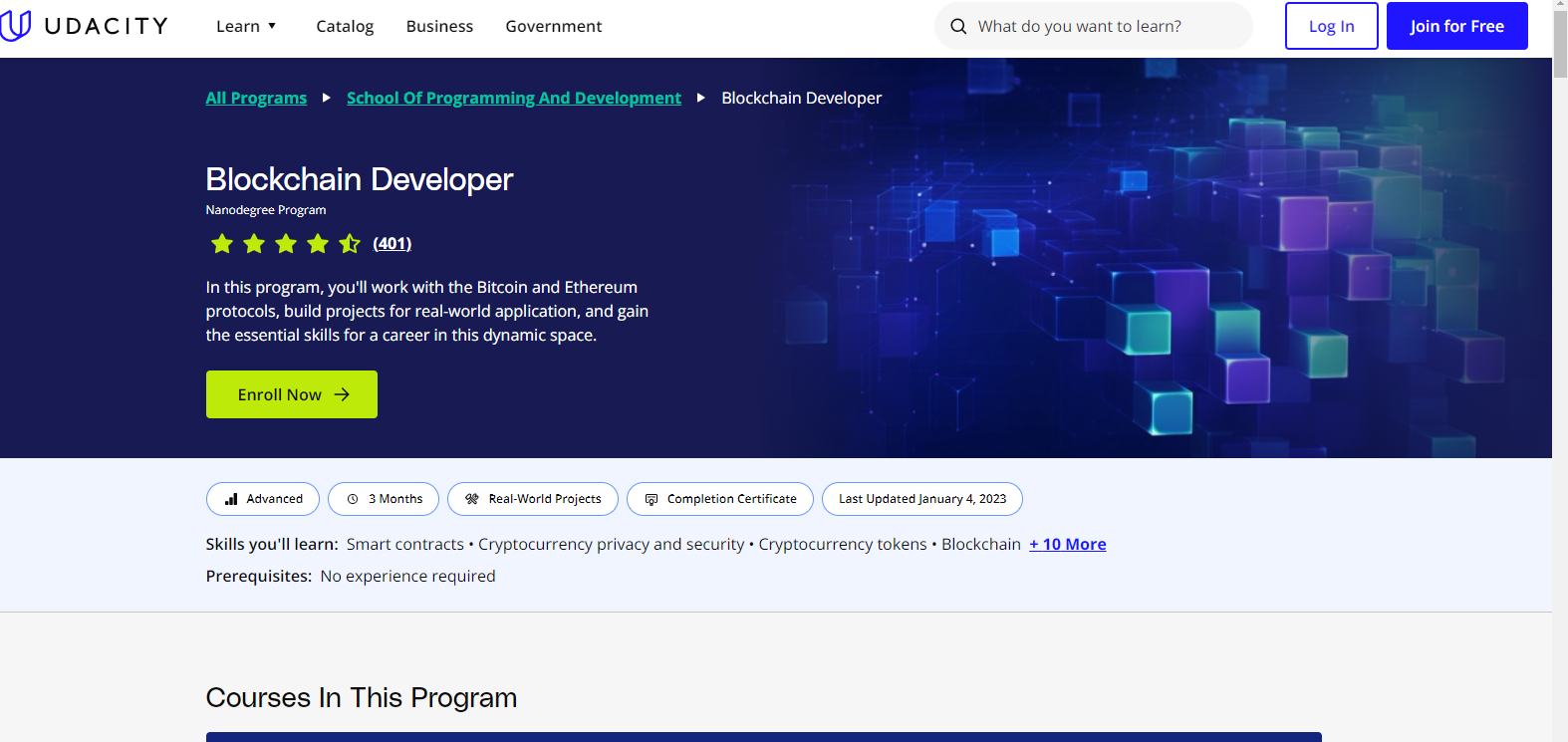
This 6 month comprehensive program from Udacity in collaboration with Ethereum developers covers foundation concepts like cryptography hashes and blockchain consensus, core Ethereum smart contract programming using Solidity, developing decentralized apps and product strategy, user interfaces and asset tokenization methods.
The capstone project allows applying learnings to build an end-to-end production ready decentralized application. Udacity blockchain curriculum is co-created by expert Sebastian Wain, CEO of Coinbase. It allows hands-on development enforced by code reviews and guidance from mentors. Graduates showcase Nanodegree program credential to employers indicating deeper and validated expertise levels in the blockchain development field.
3. Coursera
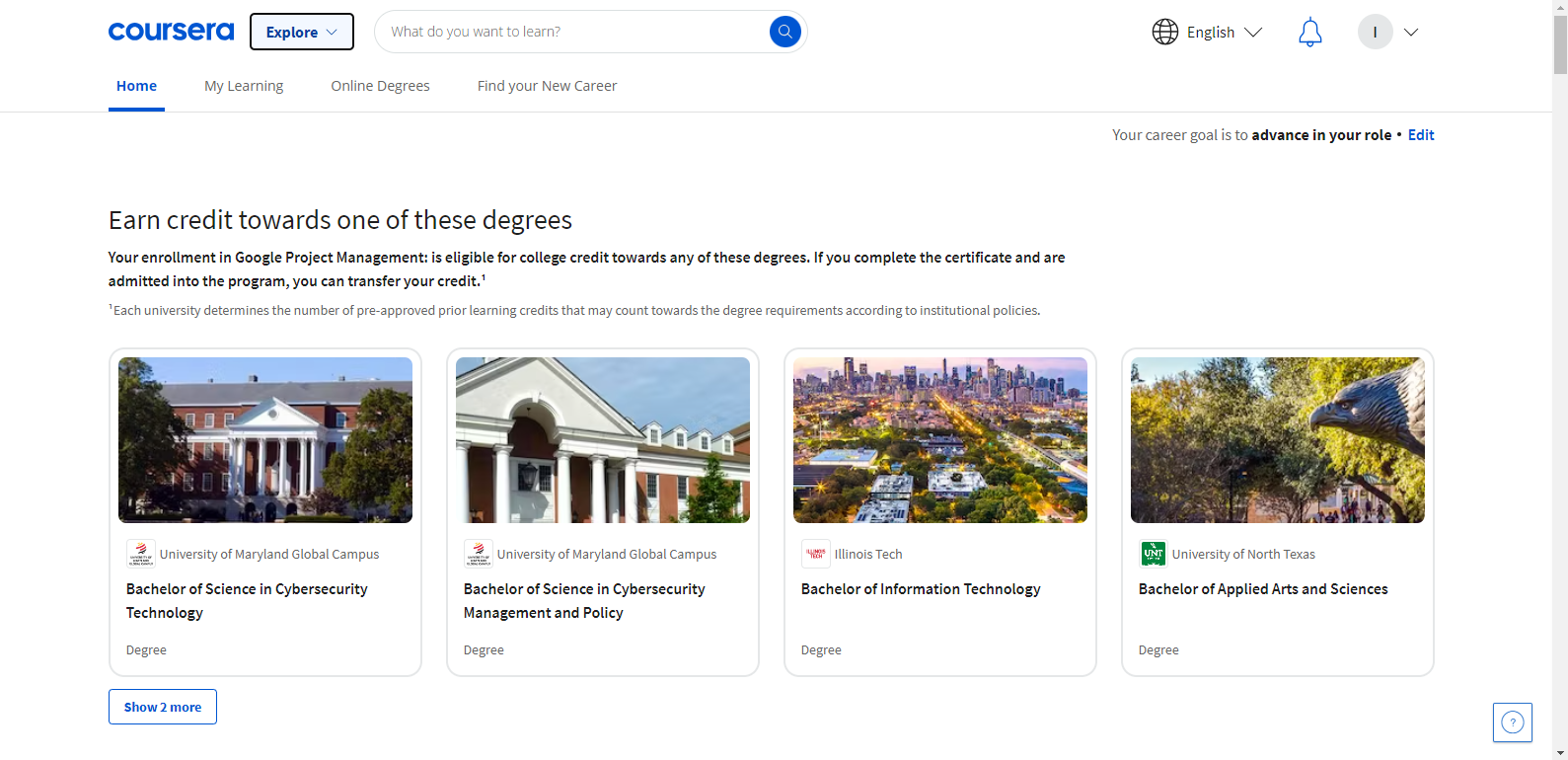
Cryptocurrency & Bitcoin Courses Offered on the Coursera platform in collaboration with famous universities, there are multiple course options to learn cryptocurrency technologies depending on suitable level.
The Bitcoin and Cryptocurrency Technologies course from Princeton University covers technical foundations of Bitcoin and blockchain technology spanning distributed consensus, cryptocurrency wallets, mining proof-of-work, bitcoin scripting, privacy and more.
The University of Buffalo offers a 4 course Cryptography specialization covering core theory relevant to blockchains like symmetric encryption, public key infrastructure, cryptographic proofing used by crypto developers. Guided projects reinforce learnings from a strong academic perspective.
4. edX Blockchain Technology Course
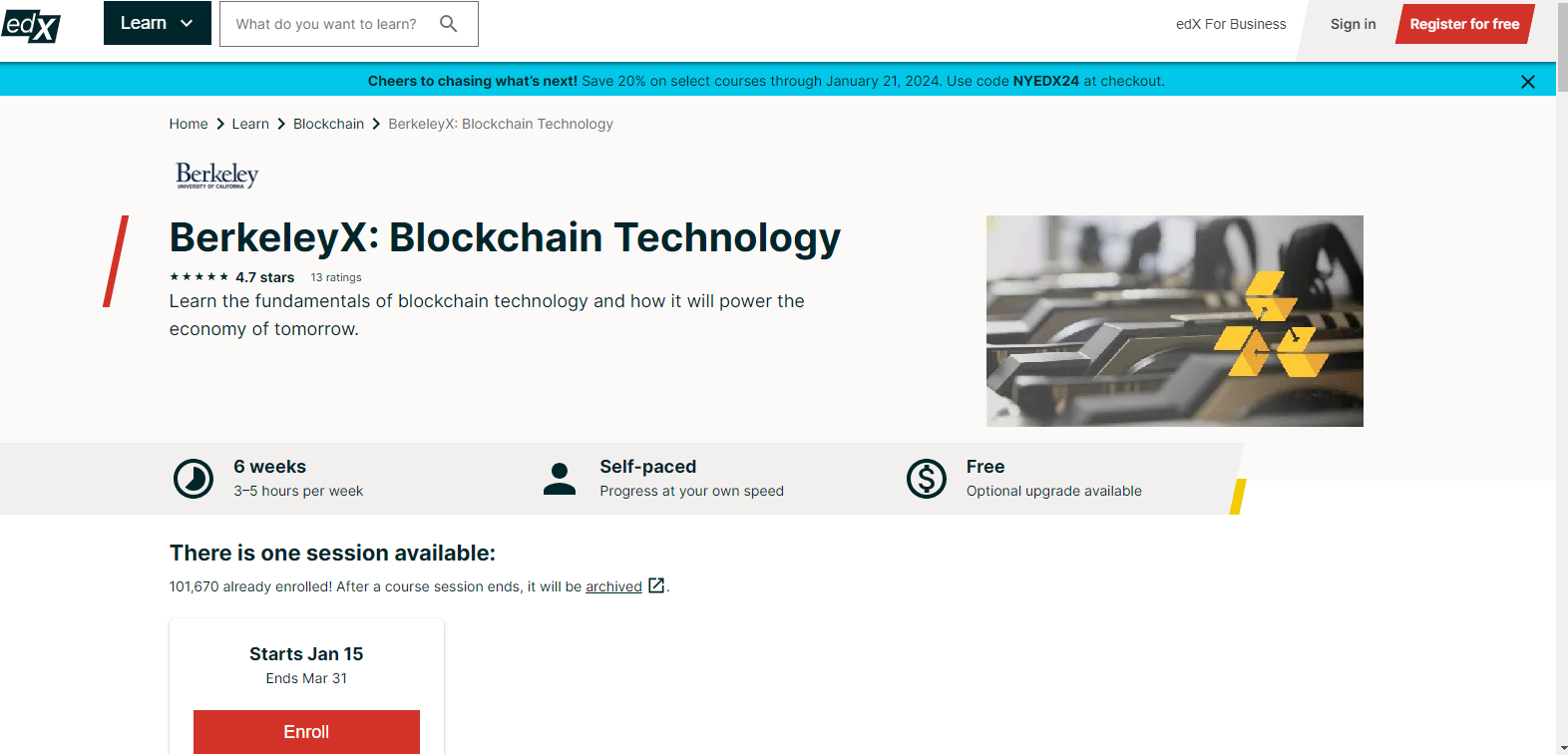
Created in partnership between Linux Foundation and IBM, this intermediate level course on Enterprise Blockchain technology is optimal for developers looking to skill up on the Hyperledger and Enterprise DLT model for building blockchain applications.
It covers cryptographic hashes,permissioned ledgers, Hyperledger Fabric components like channels, private data, chaincodes, client SDKs, smart contracts, consensus mechanisms and case studies of real world enterprise blockchain use cases across supply chain, finance, medical records etc.
Free audit mode allows previewing half the course content without graded assignments or certification.
www.edx.org/learn/blockchain/university-of-california-berkeley-blockchain-technology
5. Ethereum Stack Exchange Ethereum
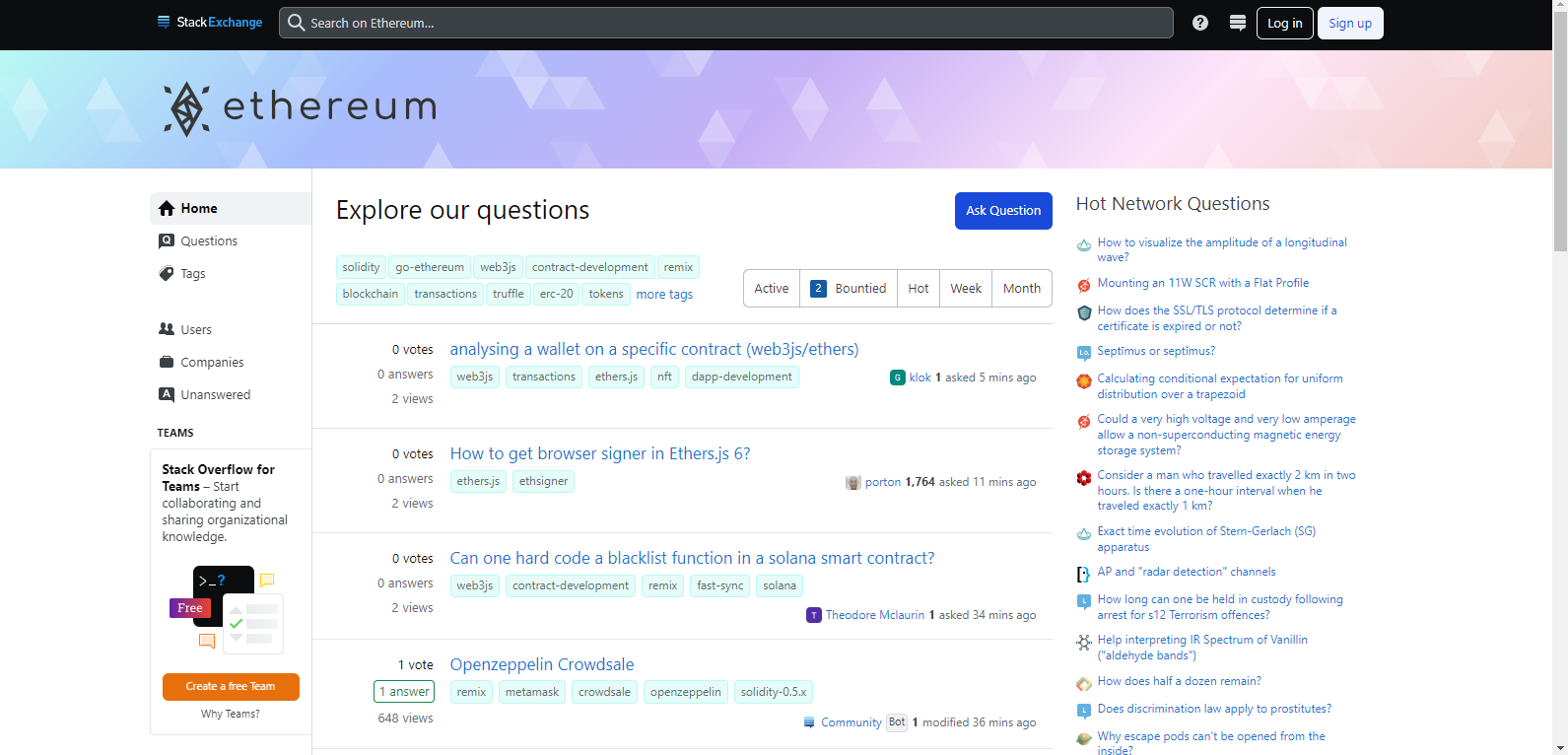
Stack Exchange is a focused question and answer site for blockchain developers working with Ethereum and smart contracts to clear doubts, unblock issues and accelerate development.
With over 19,000 questions already answered by a knowledgeable community of Web3 builders spanning tags like Solidity, Vyper, Web3.js, Cryptography, Gas optimization, Security audits and more, it serves as a quick reference resource with context derived solutions. Concise questions and problem focused answers make it more efficient than discussion forums. Reputation points incentivize community members.
https://ethereum.stackexchange.com/
6. Udemy Bitcoin Development Courses
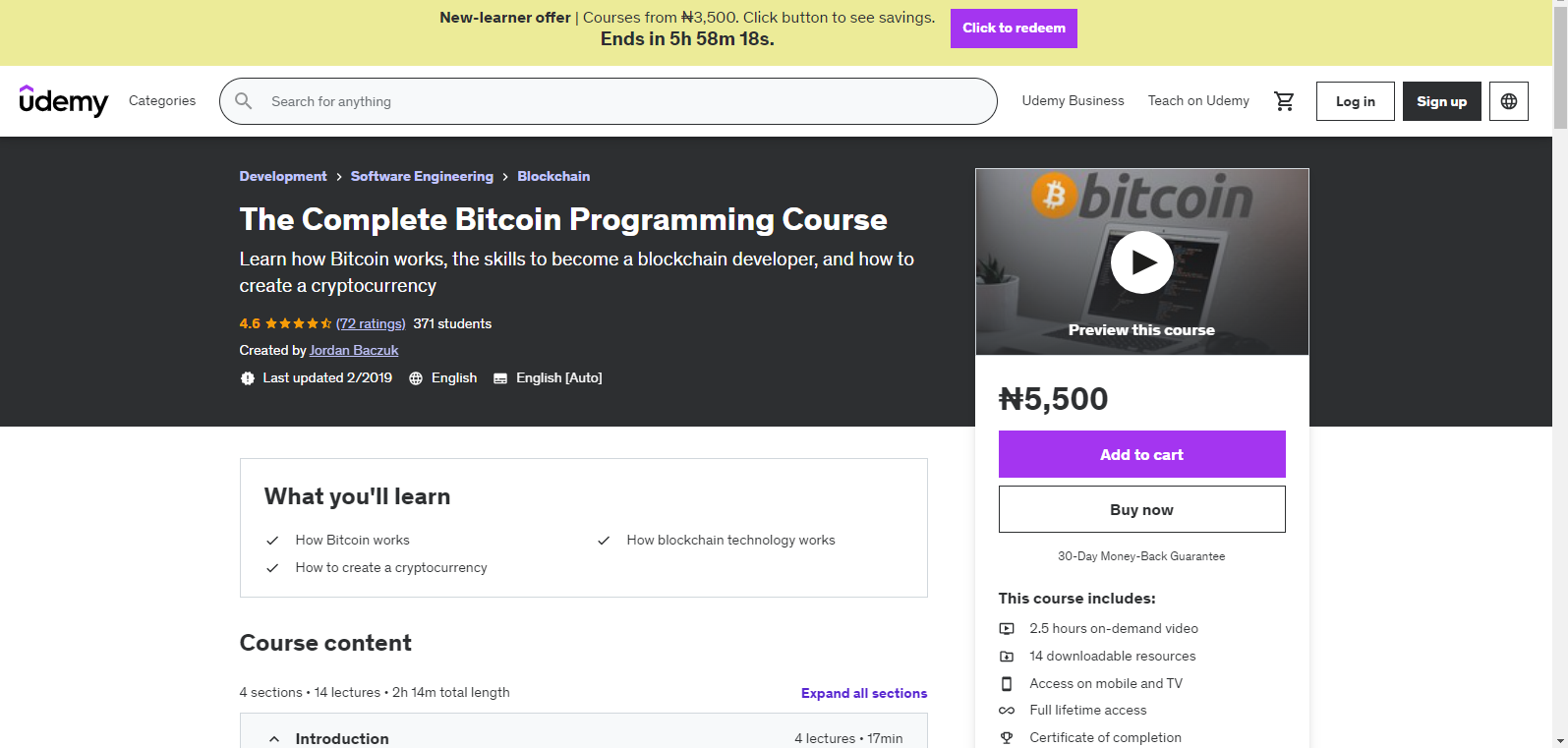
As one of largest global e-learning platforms, Udemy offers many affordable on-demand video courses for blockchain developers ranging from foundational to advanced levels.
This includes comprehensive course bundles like Blockchain A-Z and Ethereum Blockchain Developer Bootcamp to master skills as well as tactical courses focusing explicitly on topics like Mastering Bitcoin using Python, Decentralized Finance (DeFi), Non-Fungible Tokens(NFTs), oracle services like Chainlink and even specialized case studies like building Dapps on Layer-2 scaling solutions which complement core protocol knowledge.
https://www.udemy.com/course/create-your-own-blockchain/
7. Cardano Developer Resources
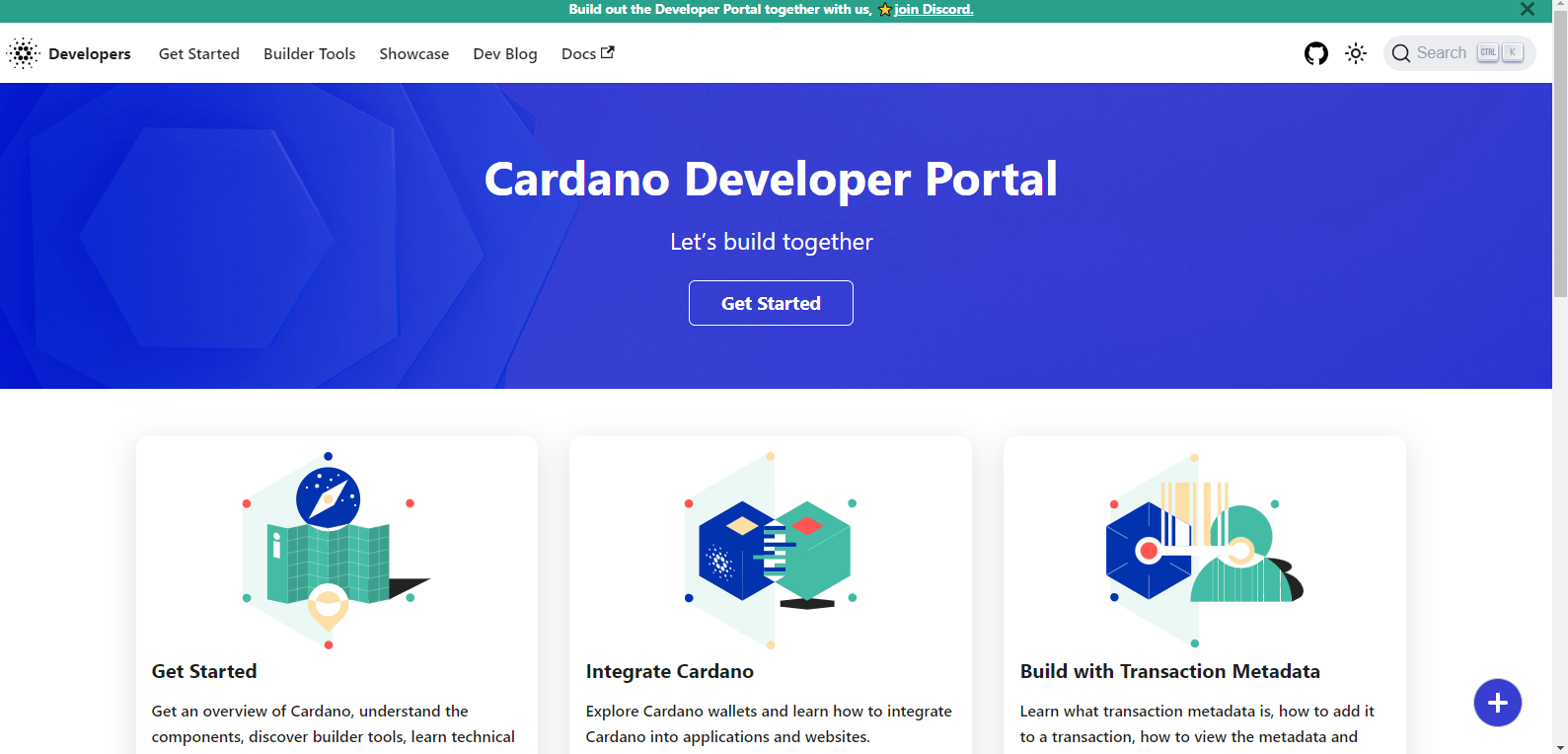
Cardano provides extensive technical documentation and learning resources for developers integrating with its layer-1 blockchain platform to build decentralized apps and services. The Plutus Pioneer Program offers a hands-on smart contract development course using the Plutus functional programming language on the Cardano testnet.
The Cardano workshops repository on Github also covers sample full-stack DApp implementations for reference. Concept and explainer articles make architectural considerations behind the Cardano ecosystem transparent spanning Ouroboros proof-of-stake, extended UTXO model, staking incentives, governance philosophy allowing developers to appreciate differentiated design decisions.
https://developers.cardano.org/
8. Ivan on Tech Academy Bitcoin and Blockchain Courses
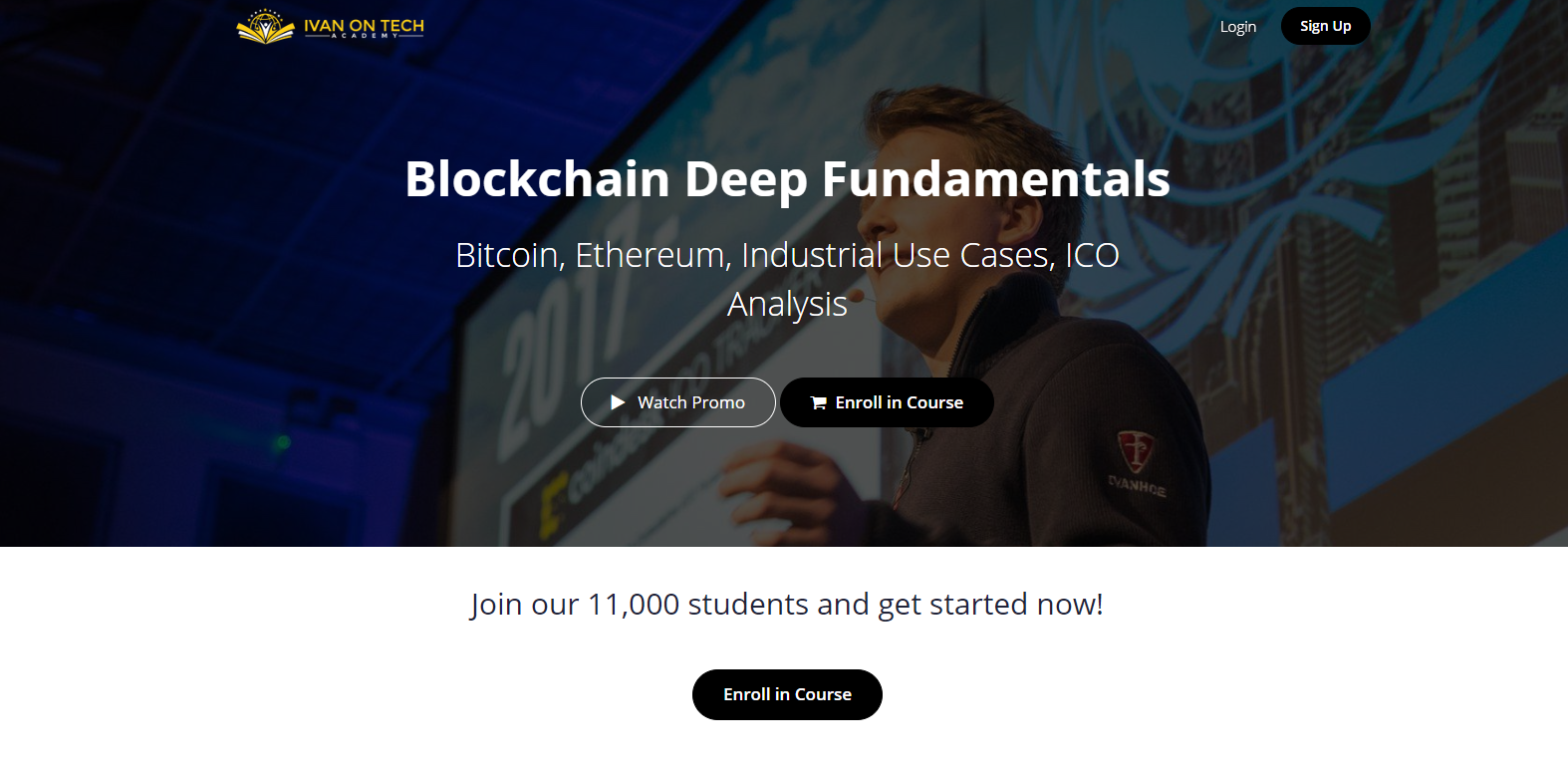
Created by Ivan Liljeqvist and a team of developers, this online academy focuses on structured learning paths for blockchain developers including foundational to advanced level video courses on Bitcoin, Ethereum, Polkadot, Cosmos and other leading protocols.
Sample curriculum spanning C++, Rust, Solidity, Web3py, React dapp creation use hands-on coding templates allowing learners to build real world decentralized finance projects, wallets, NFT marketplaces and other innovative blockchain products through guided experience with personalized mentorship support.
Programs tailored for both new programmers and seasoned professional with affordable tiered pricing and free previews.
https://ivanontech.teachable.com/p/blockchain-fundamentals
How to build practical projects to build expertise as a Bitcoin Developer
With blockchain technology careers rising and cryptocurrency development paths offering new opportunities, deliberately practicing your skills through practical projects is vital to succeeding as a Bitcoin developer.
Start by going through free Bitcoin developer training materials to grasp the fundamentals. Sites like Ivan on Tech Academy and Semaphore provide great introductory courses to learn about blockchain data structures, Bitcoin nodes, wallets, transactions, and scripting smart contracts. For deeper knowledge, you can also find paid Bitcoin development courses on Udemy and Coursera.
Once comfortable with the basics, install Bitcoin Core and set up your own Bitcoin node on your computer. Configure it to connect with the mainnet and explore the production blockchain ledger from your node's perspective. Make some test transactions from your wallet and trace them on the live network - observing the transaction lifecycle from pending status to confirmed.
To reinforce your learnings:
- Build a simple command line Bitcoin wallet.
- Create key pairs and build transactions to transfer simulated bitcoin between addresses.
- Sign the transactions properly using your keys.
Parses the blockchain using Bitcoin Core APIs to display your wallet's balance and transaction history. This Bitcoin tech career foundation builder project combines many core skills.
Expand your capabilities by connecting your wallet to your own Bitcoin node via remote procedure calls. Make it detect payments to associated addresses and automatically synchronize confirmed balances.
You can find ideas for more projects with increasing complexity on Bitcoin and blockchain development platforms like GitHub. Contribute to open-source Bitcoin projects by fixing bugs on their GitHub issues list to gain real experience. Allowing testing and deployment best practices.
Consider specialized assignments like building a block explorer to index and query transactions, designing an on-chain Bitcoin micropayments solution, or creating a visual diagram of the Lightning Network's payment channels. React UIs connected via API to a Bitcoin test node back end.
Pushing your abilities through real-world Bitcoin projects at an increasing scale iteratively will build expertise even without a prior industry background. As concepts click together, your confidence and skills as a professional Bitcoin developer will dramatically improve. Allowing you to approach job roles or entrepreneurship with a solid demonstration of capabilities.
Where to get Bitcoin Development jobs in 2024
As blockchain technology careers grow with Bitcoin and cryptocurrency adoption, many developers are choosing this exciting development path. You can access rewarding Bitcoin tech career options by picking up in-demand skills through free Bitcoin developer training, paid courses, and hands-on projects.
The first stop is blockchain development company career pages and job boards. ConsenSys, Chainlink, Blockstream, Gemini, and Coinbase often have openings for engineers across distributed systems, protocol design, and wallet development.
With remote work gaining traction, global job boards also provide opportunities to work on Bitcoin projects from anywhere. Bitcoin and cryptocurrency-specific searches on LinkedIn, AngelList, RemoteOk, and PowerToFly reveal expanding choices spanning early-stage blockchain startups to mature unicorns.
Attending regional Bitcoin and Ethereum meetups helps connect with other local developers and companies looking for talent. Conferences like the yearly Bitcoin 2022 in Miami also present networking opportunities alongside workshops and hack projects to showcase skills. A proactive profile on GitHub stacked with contributions to blockchain projects signals capabilities better than any resume.
Experimenting with building decentralized apps across blockchain development platforms like Ethereum, Cardano, and Solana also prepares you for 'Web3 developer' roles, which blend Bitcoin, tokenized assets, and self-executing smart contracts.
With a solid expertise in Bitcoin Core protocol, Lightning Network, and complementary knowledge of popular frameworks like BitcoinJ and BTC Pay Server plus proficiency in languages like Python, Go, and Rust, lucrative avenues open up within the industry spanning payments companies, exchanges, crypto lenders and infrastructure providers worldwide.
The accelerating work in Bitcoin micropayments, decentralized finance through trustless composability between blockchains, and the rising token economy means there is no lack of opportunities for skilled Bitcoin technologists. Learning continuously, contributing to communities, and embracing the decentralization ethos will serve you well on this career path.
Rounding up – Future of Bitcoin Development
As Bitcoin enters its second decade, the opportunities for developers in this space are brighter than ever. We have only scratched the surface regarding leveraging Bitcoin and its underlying blockchain technology to transform payments and finance and build a more open, accessible, decentralized internet.
With improving language support, upcoming upgrades that enhance privacy and scalability even further, plus maturing frameworks across wallets, merchants' applications, and decentralized financial services, the building blocks are lining up. The increasing institutional and nation-state adoption of Bitcoin also means its long-term viability is more entrenched.
For developers entering this domain today, rest assured that mass-market use cases benefiting everyday users are more evident than ever before.
Learning by doing, sharpening your axes, and aligning to community ethos will set you up for an exciting career where financial, creative, and human freedom intersect toward a better future. The next generation of Bitcoin and its decentralized ecosystem awaits your participation.